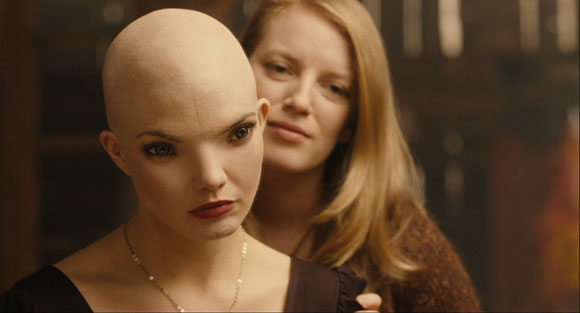Splice

(L-R) DELPHINE CHANEAC as Dren and SARAH POLLEY as Elsa Kast in Warner Bros. Pictures' and Dark Castle Entertainment's science fiction thriller "SPLICE," a Warner Bros. Pictures release. Photo courtesy of Warner Bros. Pictures

It’s a real conundrum when you see a movie that takes such a bewildering turn of events, but you’re afraid to laugh. At the screening, Michael Granberry of the Dallas Morning News introduced me to Marshall Terry, a distinguished creative writing professor at Southern Methodist University. His daughter, Antoinette Terry Bryant, has a story and screenwriting credit in this movie. They’re wonderful, intellectual individuals.
The story and screenplay were co-authored by Ms. Bryant and writer/director Vincenzo Natali. My guess is that the third, Doug Taylor, was pulled in at the studio’s behest to embellish the story with an action-driven ending. I’m not sure if I was wincing at the film, or at the thought of Professor Terry having no idea what he was in for.
Splice begins with an interesting, if scientifically-inaccuarate premise. Clive Nicoli (Adrien Brody) and Elsa Kast (Sarah Polley) are scientists trying to synthesize a protein that will lead to a major breakthrough in immunology. Their first experiment, two formless creatures created as a result of splicing pieces of various organisms’ genomes, results in a catastrophic mess—quite literally. Relentless, Elsa pushes on to the next stage in their gene meddling. Despite Clive’s pleas to cut the experiment short, Elsa soldiers on—determined to find the solution. Naturally, in movie science this means violating some basic codes of ethics.
The result is Dren (Delphine Chanéac), a chimaera who looks mostly human with some modifications. She takes her name from arranging “NERD” backward during a game of Scrabble, where she exhibits an accelerated grasp of language (but no ability to reproduce it). As she grows up, she becomes more aware of her confinement as well as her burgeoning sexuality. What?! Yes. She also becomes dangerous, sporting a venom-tipped stinger. Up to this point, the director seems to be exploring various themes of adolescence and parenting. But as we get to know the parents, who move her out of the research facility and to the remote farm where Elsa grew up, we begin to learn more about Elsa’s checkered past.
An interesting, if used, possibility arises. Elsa becomes gradually consumed by the psychological trauma of her childhood. Wouldn’t it have been fascinating if they kept going down this corridor? She was transforming into something far more creepy and sinister than a monkey-bat-human-plant-whatever hybrid. Instead, the film degenerates into an orgy… of sorts.
Another creative twist is abandoned: While the film is marketed as sci-fi/horror, a good part of the narrative is spent focusing on Dren’s impact on Clive and Elsa’s working and personal relationships. A parable on parenting, Splice begins to examine the stressors and idiosyncrasies of establishing rules, teaching and engaging a child, and how taxing this can all be on a young couple. Dren, essentially could be the MacGuffin around whom Clive and Elsa’s lives revolve and evolve—or devolve, rather. Sarah Polley and Adrien Brody are certainly accomplished enough as actors to handle the nuances of such a character study.
But just when all of this potential becomes evident, the story takes a hard left turn in the same way Lawrence Kasdan’s Dreamcatcher did. That film had this intriguing concept of a “memory warehouse” in which the collective intelligence, experiences and knowledge of four lifelong friends resided. However, the film left us with Thomas Jane talking into a gun, Morgan Freeman’s glued-on eyebrows, Donnie Wahlberg as a mentally-challenged alien and space parasites that cause excessive flatulence. I won’t spoil what this film leaves you with, but I will just say that it’s a classic case of two scientists being screwed by their own experiment.
 Splice • Dolby® Digital surround sound in select theatres • Aspect Ratio: 1.85:1 • Running Time: 104 minutes • MPAA Rating: R for disturbing elements including strong sexuality, nudity, sci-fi violence and language. • Distributed by Warner Bros. Pictures
Splice • Dolby® Digital surround sound in select theatres • Aspect Ratio: 1.85:1 • Running Time: 104 minutes • MPAA Rating: R for disturbing elements including strong sexuality, nudity, sci-fi violence and language. • Distributed by Warner Bros. Pictures
Dolby and the double-D symbol are registered trademarks of Dolby Laboratories.